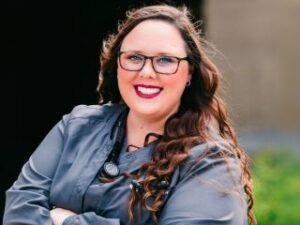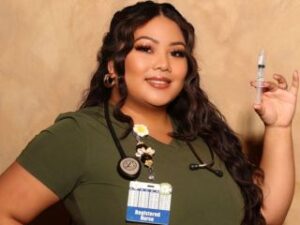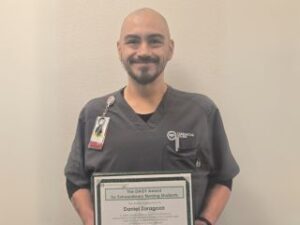Please tell us a little bit about yourself.
I am 26-years-old and I grew up in San Joaquin county in a little community called French Camp on the outskirts of Stockton. I went to an experiential public charter school that was on a farm where we did regular academics and we also had morning chores, participated in 4-H showing goats, and rode horses when our work was done. My mom was always a big cat person and I think cats would kind of pick up on that. So, if animals were in need or hungry, they would often show up on our doorstep and find us to take care of them. I eventually got a dog and it was that dog that made me want to go into the veterinary field. She was a labrador retriever and she had an autoimmune disease called Evans Syndrome. I was going to the vet multiple times and the technicians were always so nice. I thought, ‘this is something I want to do,’ but I originally thought from my experiences in school that I wanted to work with large animals. Today, I work with dogs, cats, and exotics—which are mostly birds, reptiles, rabbits, and guinea pigs.
When did you decide to pursue a career as a vet tech?
I would say that it was probably 2016 when I went for it through Carrington. I always wanted to do it but I wasn’t sure how I was going to get into it. Then I saw an ad and I was interested, but a little nervous. I wasn’t sure if I was ready to do something so big, but then I decided to jump right in headfirst. I went for it! Here I am now an RVT. I made it all the way through and I wasn’t always sure I would! It’s definitely worth it. It’s very rewarding to me. I was meant to do this.
What motivated you to choose Carrington?
Probably because they put you on the straight path to get things done and help you all along the way.
What was your favorite part of your program at Carrington?
The hands-on stuff was my favorite. So, the labs, especially the surgery portion in the 4th term.
What was the most challenging part of your program?
I’d say math was the hardest thing for me starting out. But if I can learn it, anyone can learn it! At my work we see lizards that weigh only 6 grams. Learning math at Carrington taught me how to customize their dilutions.
Did you ever want to quit when you were in school?
No, never. I knew that was where I was meant to be.
What got you through the tough times?
Knowing I can make a difference, even if it’s not a world difference it is a difference for pets and owners.
Is there a Carrington instructor or staff member who you would like to acknowledge?
Amy Able, she was easy to talk to and she would walk us through everything. I think she made a difference, especially for me.
Please tell us about your current work.
I am working at a veterinary hospital in Modesto with two veterinarians and at least 8 techs and 4 to 5 receptionists. It is kind of like a little family, which is often hard to find. We are always joking and laughing, which I think helps keep us going. We also have friendships outside of work. I got my first experience there during my 2nd term at Carrington and then I went back during my externship, which ended up being like a working interview. They hired me during my externship and I just had my 3 year anniversary on July 16th.
How did Carrington prepare you for your career?
I’d say pretty well, especially during the 4th term—the surgery one. We would split up into teams of four and we had real patients that we worked on in a mock clinic. We would draw their blood and the animal would have an exam. We’d even have to call the owner, which in this case would be another student in our class, and communicate instructions about the appointment, which would be things like not letting the animal eat the morning of the appointment and stuff like that. That helps prepare you for talking to clients and it’s not as scary as talking to a complete stranger. It helped prepare me in how I am going to talk to people. Of course, more is learned along the way through experience but Carrington gave me a good foundation.
Do you have any advice for people interested in going into your field?
If this is something that is your passion, go for it. You can make a difference in people’s lives. There are also many opportunities to keep learning after you graduate and pass your test. You can work towards a specialty. That is what I am doing—working towards a specialty. So, I won’t just be an RVT but an RVT specialist, too. That will be a little bit down the road because you have to have your license for three years for what I am interested in, which is dentistry. It’ll be two more years before I can pursue that. Now I just have to collect the hours. I went to my first conference for dentistry. They had a dental specialist there. We had to work on cadaver heads from cats and dogs. They walked us through everything from localized injections, nerve blocks, and x-rays. It was very interesting and it confirmed that is what I want to do. It’s great because once you become an RVT, you get to take classes and continue to expand your knowledge.



